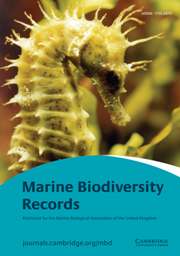Article contents
Confirmation of recent hawksbill turtle Eretmochelys imbricata nesting activity on South Caicos, Turks and Caicos Islands
Published online by Cambridge University Press: 28 August 2013
Abstract
Sea turtle nesting had thought to be extirpated from South Caicos decades ago, but in December 2012 hatchling hawksbill turtles Eretmochelys imbricata were discovered emerging from the sand on a small beach in Shark Bay. Nest emergence was asynchronous and was spread out over at least two weeks. The nest was subsequently excavated and was found to contain the remains of 142 eggs, 128 of which appeared to have hatched successfully. It is unclear if Shark Bay is a regular nesting site, or if this nesting event was a transient occurrence.
Keywords
- Type
- Research Article
- Information
- Copyright
- Copyright © Marine Biological Association of the United Kingdom 2013
References
REFERENCES
- 1
- Cited by


